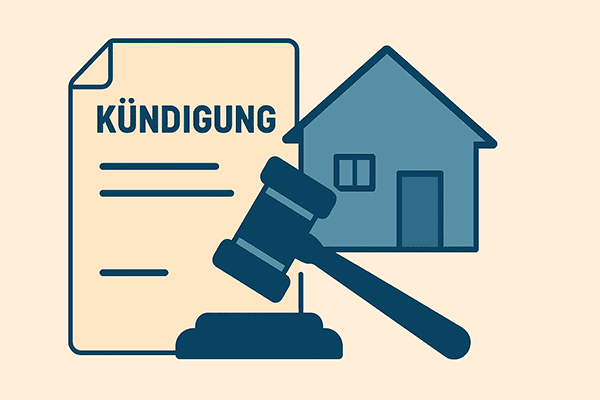Nice to have you here
at WG-Gesucht.de!
at WG-Gesucht.de!
Select Credit Report
Please choose a provider for your credit report.
 An extraordinary termination ends the lease immediately — it’s only justified for severe breaches or unsafe conditions and must be clearly documented in writing.
An extraordinary termination ends the lease immediately — it’s only justified for severe breaches or unsafe conditions and must be clearly documented in writing.
An extraordinary termination (also known as immediate termination) is a special legal option that allows either party — tenant or landlord — to end the lease without notice when serious reasons make continuation of the tenancy unreasonable (§ 543 BGB).
Unlike ordinary termination, there is no notice period. The tenancy ends immediately once the written notice is received. However, a significant breach of duty must exist, and usually a prior warning (Abmahnung) is required before taking this step.
A landlord can terminate the lease without notice if the tenant seriously violates contractual obligations. Common grounds include:
Usually, the landlord must issue a written warning first, allowing the tenant a chance to correct the behavior. Only in severe or repeated cases is immediate termination legally valid.
Tenants also have the right to terminate the lease without notice if the landlord grossly breaches contractual duties. Typical examples include:
In most cases, a written warning (Abmahnung) must be issued before an extraordinary termination to give the other party a chance to comply. Only in exceptional situations — such as violence, serious threats, or immediate health danger — can the lease be terminated without prior notice.
The termination must be made in writing, clearly stating the reason. Verbal or informal termination (e.g., via email) is invalid. The termination becomes effective once it is received by the other party.
Once the termination is effective, the affected party must vacate the apartment immediately. If they refuse, the other side can initiate a legal eviction procedure.
Tenants are no longer required to pay rent from that point onward, but the landlord may claim compensation for damages if the tenant caused the termination through their own fault. Conversely, if the landlord is at fault, the tenant may demand compensation for resulting losses.
Extraordinary termination is a last resort and should only be used in cases of severe misconduct or intolerable conditions. Both parties should document evidence, record all correspondence, and seek legal advice before proceeding.
Proper preparation helps prevent unnecessary disputes and ensures that the termination will hold up in court.
Only in cases of serious breach of duty — such as non-payment, unauthorized subletting, or dangerous living conditions.
Yes, in most cases. Only when there is a grave and urgent reason, like a health hazard or violence, can it be skipped.
It must be in writing, include the specific reason, and be delivered to the other party to take effect.